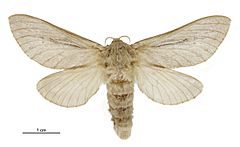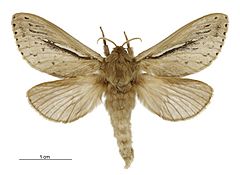Wiseana umbraculatus facts for kids
Quick facts for kids Wiseana umbraculatus |
|
|---|---|
 |
|
| Female specimen. | |
 |
|
| Male specimen. | |
| Scientific classification | |
| Kingdom: | |
| Phylum: | |
| Class: | |
| Order: | |
| Family: |
Hepialidae
|
| Genus: | |
| Species: |
W. umbraculata
|
| Binomial name | |
| Wiseana umbraculata (Guenée, 1868)
|
|
| Synonyms | |
|
|
The bog porina (scientific name: Wiseana umbraculata) is a type of moth found only in New Zealand. It belongs to a group of moths called the Hepialidae family. A scientist named Achille Guenée first described this moth in 1868. He used specimens collected by Richard William Fereday to study it. In the early 1900s, this moth was very common in the Whanganui area of New Zealand.
Contents
What the Bog Porina Looks Like
The bog porina moth has different sizes depending on if it's a male or a female. Male moths have a wingspan (how wide their wings are) of about 38 to 50 millimeters. Female moths are a bit bigger, with wings 49 to 66 millimeters wide.
Wing Colors and Patterns
The front wings of the bog porina can be different colors. They are usually fawn (a light yellowish-brown), pinkish-fawn, or a darker, smoky color. The back wings are often pinkish-fawn to yellow-fawn. These moths are usually seen flying around from September to April.
Bog Porina Life Cycle
Like many insects, the bog porina goes through different stages in its life. It starts as an egg, then hatches into a larva, which is like a caterpillar. After that, it turns into a pupa, and finally, it becomes an adult moth.
What Larvae Eat
The larvae (caterpillars) of the bog porina moth mostly eat different kinds of grass. Because they eat grass, they can sometimes cause problems for farmers. They are known as a major pest in pastures, which are fields where animals like sheep or cows graze.

